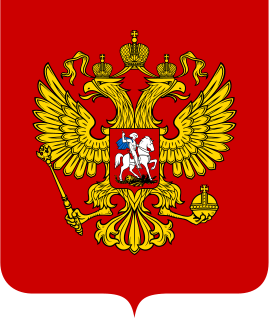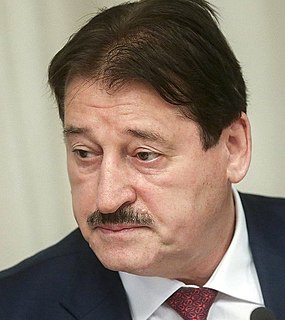Related Research Articles

Chechnya, officially the Chechen Republic, is a constituent republic of Russia situated in the North Caucasus in Eastern Europe, close to the Caspian Sea. The republic forms a part of Russia's North Caucasian Federal District, and shares land borders with the country of Georgia to its south; with the Russian republics of Dagestan, Ingushetia, and North Ossetia-Alania to its east, north, and west; and with Stavropol Krai to its northwest.

The Second Chechen War was an armed conflict in Chechnya and the border regions of the North Caucasus between the Russian Federation and the Chechen Republic of Ichkeria, fought from August 1999 to April 2009.

The Federal Security Service of the Russian Federation is the principal security agency of Russia and the main successor agency to the Soviet Union's KGB. Its main responsibilities are within the country and include counter-intelligence, internal and border security, counter-terrorism, and surveillance as well as investigating some other types of grave crimes and federal law violations. It is headquartered in Lubyanka Square, Moscow's center, in the main building of the former KGB. According to the 1995 Federal Law "On the Federal Security Service", direction of the FSB is executed by the president of Russia, who appoints the Director of the FSB.

Ramzan Akhmadovich Kadyrov is a Chechen politician currently serving as the Head of the Chechen Republic. He was a former member of the Chechen independence movement.

As a successor to the Soviet Union, the Russian Federation remains bound by such human rights instruments as the International Covenant on Civil and Political Rights and International Covenant on Economic, Social and Cultural Rights (fully). In the late 1990s, Russia also ratified the European Convention on Human Rights and from 1998 onwards the European Court of Human Rights in Strasbourg became a last court of appeal for Russian citizens from their national system of justice. According to Chapter 1, Article 15 of the Constitution adopted in Russia in December 1993, these embodiments of international law take precedence over national federal legislation. However, from Vladimir Putin's second term as President (2004–2008) onward there were increasing reports of human rights violations.

Alu Dadashevich Alkhanov is a Chechen politician, the former president of Russia's Chechen Republic.

Anna Stepanovna Politkovskaya was a Russian journalist, writer, and human rights activist who reported on political events in Russia, in particular, the Second Chechen War (1999–2005).

Doku Khamatovich Umarov ; also known as Dokka Umarov as well as by his Arabized name of Dokka Abu Umar; was a Chechen Islamic extremist militant in Russia. Umarov was a major military figure in both wars in Chechnya during the 1990s and 2000s, before becoming the leader of the greater insurgency in the North Caucasus. He was active mostly in south-western Chechnya, near and across the borders with Ingushetia and Georgia.

The Kadyrovtsy, also known in English as the Kadyrovites, is a paramilitary organization in Chechnya, Russia that serves as the protection of the Head of the Chechen Republic. The term Kadyrovtsy is commonly used in Chechnya to refer to any armed Chechen men under the control of Head of the Chechen Republic Ramzan Kadyrov.
Russia incurred much international criticism for its conduct during the Second Chechen War, which started in 1999. The governments of the United States and other countries condemned deaths and expulsions among civilians. The United Nations Commission on Human Rights (UNHCR) passed two resolutions in 2000 and 2001 condemning human rights violations in Chechnya and requiring Russia to set up an independent national commission of inquiry to investigate the matter. However, a third resolution on these lines failed in 2004. The Council of Europe in multiple resolutions and statements between 2003 and 2007 called on Russia to cease human rights violations. The European Court of Human Rights (ECHR) between 2005 and 2007 conducted legal cases brought by Chechens against the Russian government, and in many of these cases held Russia responsible for deaths, disappearances and torture.
The International Foundation for Civil Liberties is a non-profit organization established by the Russian-British oligarch Boris Berezovsky in November 2000. The foundation is headquartered in New York City and headed by Alexander Goldfarb. The stated mission of the foundation is "to provide financial, legal, informational and logistical resources to secure human rights and civil liberties in Russia."
Mikheyev v. Russia was a 2006 court case involving Alexey Mikheyev and the Russian Federation. The case became notable as "the first serious victory in a case of torture" brought to the European Court of Human Rights against the Russian government. The case was brought forward by the Russian NGO Committee Against Torture and submitted to the European Court of Human Rights on November 16, 2001.
Estimates of casualties in the Second Chechen War vary wildly, from 25,000 to 200,000 civilian dead plus 8,000 to 40,000 Russian military.
Since the start of the Second Chechen War in 1999, Russian federal authorities are alleged to have implemented a plan to use legal and extralegal methods to limit media access to the conflict region.
The Norwegian Support Committee for Chechnya is a Norwegian advocacy group.
Phone Call to Putin is a slang term used by some Russian police departments for torture method which consists of administering electric shocks to the person's earlobes and/or nose, and genitals. According to Amnesty International, torture with electric shocks by security forces and prison, jail, and penal colony guards is common in Russia.

Lesbian, gay, bisexual and transgender rights in Chechnya have long been a cause for concern among human rights organizations such as Amnesty International and Human Rights Watch. As a part of the Russian Federation, Russia's LGBT laws formally apply. De facto, there are no protections for LGBT citizens, and the Chechen authorities allegedly encourage the killing of people suspected of homosexuality by their families.

Natalya Khusainovna Estemirova was a Russian human rights activist and board member of the Russian human rights organization Memorial. Estemirova was abducted by unknown persons on 15 July 2009 around 8:30 a.m. from her home in Grozny, Chechnya, as she was working on "extremely sensitive" cases of human rights abuses in Chechnya. Two witnesses reported they saw Estemirova being pushed into a car shouting that she was being abducted. Her remains were found with bullet wounds in the head and chest area at 4:30 p.m. in woodland 100 metres (330 ft) away from the federal road "Kavkaz" near the village of Gazi-Yurt, Ingushetia.

Anti-gay purges in Chechnya in the Chechen Republic, a part of the Russian Federation, have included forced disappearances—secret abductions, imprisonment, torture—and extrajudicial killing by authorities targeting persons based on their perceived sexual orientation. An unknown number of people, who authorities detained on suspicion of being gay or bisexual, have reportedly died after being held in what human rights groups and eyewitnesses have called concentration camps.
References
- ↑ Russian-Chechen Friendship Society is under severe risk of being destroyed by Russian authorities, Prague Watchdog human rights monitor, 2 November 2005. Accessed: 07-22-2009.
- 1 2 All-Russian Civil Congress (30 January 2007). Верховный суд ликвидировал общество Российско-Чеченской дружбы. Арсеньевские вести (in Russian) (5).
- ↑ Russia: Activist’s Conviction Hurts Freedom of Expression, Human Rights Watch, New York, 4 February 2006
- ↑ Jamestown Foundation. Accessed: 07-22-2009.
- ↑ "Russian-Chechen Friendship Society Closed". Radio Free Europe. 14 October 2006. Retrieved 22 July 2009.CS1 maint: discouraged parameter (link)
- ↑ Statement from the Russian-Chechen Friendship Society following its forced closure, Front Line, 24 January 2007
- ↑ Chechnya Tribunal, A Step at a Time blog, quoting Russian-Chechen Information Agency editor Oksana Chelysheva, 4 January 2007. Accessed: 07-22-2009.
- ↑ "Vienna: United States leaves high level OSCE meeting in protest at exclusion of Russian Chechen Friendship Society". Front Line Defenders. 14 September 2007. Retrieved 15 January 2012.CS1 maint: discouraged parameter (link)
- ↑ "Russia – 2010 Annual Report". National Endowment for Democracy. August 2011.